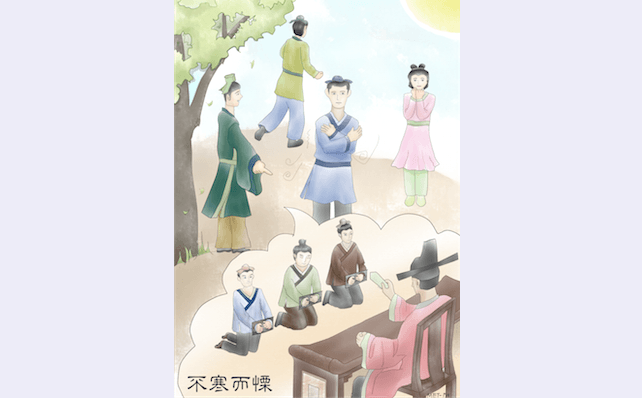During the reign of Emperor Wudi (156–87 B.C.) of the Western Han Dynasty (206 B.C. – A.D. 23), there was a man named Yi Zong who was well known for his ethics and righteousness.
Because of her excellent medical skill, Yi Zong’s sister had earned the special kindness of the emperor’s mother who later introduced him to the emperor. Subsequently, Yi Zong became a county magistrate.
Yi Zong implemented laws in a very strict manner. Without mercy or prejudice, he would bring anyone who violated the laws to justice. Because he greatly diminished the corruption of the nobility and powerful locals, Yi Zong was highly regarded by the emperor and he had a successful civil career.
When Yi Zong was appointed as the governor of Nanyang province, he heard that there was a local official, Ning, who was very vicious and whom none dared offend.
After discovering all the wicked things that Ning had done, Yi Zong immediately put him on trial and executed him.
The other corrupt officials fled. All the remaining officials and the common folk in Nanyang were afraid to break the law. They watched their words and deeds every moment in order to avoid doing something illegal.
With no corrupt officials and a greater social conscience, Nanyang became a peaceful place for people to live.
Later, Yi Zong was assigned to be the chief of Dingxiang. At that time, there were many skirmishes in the area between the Han army and the Huns and Dingxiang had become a battlefield. Some officials were easily bribed, residents suffered greatly. As a result, the region was in chaos.
After taking office there, Yi Zong interrogated more than 200 prisoners and arrested 200 or more of their relatives and friends who had offered bribes in order to absolve the serious offenders of guilt.
Consequently, Yi Zong had over 400 convicts executed in a single day.
From that day on, whenever the name of Yi Zong was mentioned, guilty people would become frightened and they would shiver as if they were cold.
This story about Yi Zong was mentioned in the “Records of the Grand Historian,” or “Shiji” (1). The phrase 不寒而慄 (bù hán ér lì) comes from that story.
Later, the phrase was used as an idiom. It means to shiver though not cold. It is used to describe the state of being extremely fearful or when something makes one’s hair stand on end.
Note
- The “Records of the Grand Historian” (史記, Shǐjì), written by the great Chinese historian Sima Qian, contains 130 volumes and covers more than 2,000 years of Chinese history, from the Yellow Emperor (2600 B.C.) to the reign of Emperor Wu of Han (87 B.C.). The story about Yi Zong is included in the biographies of government officials, Volume 122, of this historical book.




